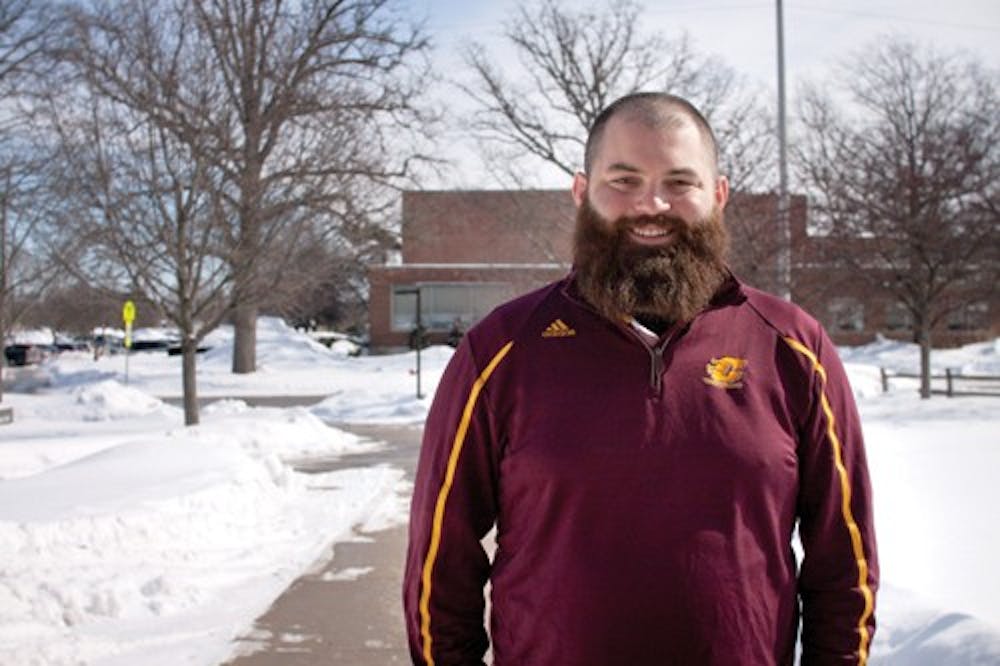From Marine to Scholar: SVA president applies life to college
Marine Infantry Corporal Shane Taylor opened a new tin of chewing tobacco as his convoy made its way through the streets of Fallujah, Iraq.
The unit had been under an increasing number of attacks since the end of Ramadan, but they felt they were safe during their security patrol. Taylor was raising the tobacco to his mouth when an IED struck the vehicle in front of them.
As the dust cloud began to clear, the confusion and chaos of the initial blast gave way to gunfire and incoming rocket-propelled grenades.
The driver of the Humvee floored the gas pedal, driving away from the ambush to the MEK Compound, a Marine base also known as Camp Fallujah.
Taylor, a Harrison junior, shared his account of the attack at a panel discussion on Nov. 14, 2013 to raise awareness for veterans on campus. Held in Dow 127, he and three other veterans spoke about their time overseas and how those experiences have affected them at Central Michigan University.
"It took me a long time to adjust and transition from that military mindset to life as a student, to really understanding that difference," Taylor said. "Student Veterans of America helped me a lot in that process."
After his tour of duty, Taylor spent several years going from job to job, unsure of what kind of career he wanted. He began studying at CMU last fall and decided to pursue a degree in sports management.
The 27-year-old joined the CMU chapter of SVA the following semester, where he served as treasurer and events coordinator for the registered student organization until being appointed as vice president in November.
Two months later, Taylor became president of the chapter at the start of the 2014 spring semester as the previous president moved on.
He also works at the Veterans' Resource Center, which helps military students on campus with advising, as well as providing financial aid collected through fundraisers. The center recently helped two student veterans find housing in Mount Pleasant – a project Taylor said was very rewarding to him.
“They were ecstatic that they finally had places of their own,” Taylor said. "Helping these veterans get what they deserve is very personal to me and it gives me a real sense of pride."
Taylor decided to join the military his freshman year of high school after the events of Sept. 11, 2001. He chose the Marine Corps because of the respect he had for his friend’s father, a USMC recruiter.
After graduation, he immediately set out for San Diego, where he completed his basic training in 2005. In the fall of 2006, he was deployed to Fallujah, Iraq, where he served for seven months.
"Shane has a lot of innate talent," said Steven Rellinger, director of the Veterans' Resource Center. "I'm not sure if you can be a natural-born leader, but if there is such a thing, he fits that bill."
The after-effects of war
When Taylor returned home, he found he was often paranoid and nervous, regularly avoiding interaction with others whenever possible.
Even though he was no longer in a war zone, he felt the need to maintain his situational awareness and be prepared for an enemy attack at any moment.
There are more than 800,000 military veterans attending colleges today with the aid of the post-9/11 GI bill. Along with the typical challenges of academic life, many of these student veterans have difficulty making the transition from military operations overseas to college life.
One common adversity for student veterans is post-traumatic stress, a psychological condition which results from extreme life-threatening experiences.
After about two years living with anxiety, Taylor started challenging himself to overcome it. He forced himself to go to public places more frequently until he became more comfortable with his surroundings.
"It’s hard for a student to come in as a veteran, especially if you've had experiences like Shane," said Tara Emmendorfer, the Veterans' Resource Center coordinator. "I think that's why the SVA has been so good for him."
Though he sometimes feels that he has not fully recovered from his experiences yet, Taylor has made a lot of progress in the last six years.
His time at CMU has also aided him in "coming back." He received support from the Veterans' Resource Center and the SVA allowed him to connect with other veterans who had gone through similar situations.
Both organizations aided him in feeling at home on campus, Taylor said.
"My whole attitude on life changed," he said. " Before, it was always go with what you know and get it done. Now, I want to learn and retain what I can. I don't want to be closed off. I want to be open-minded"




